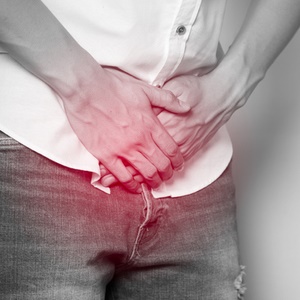
Ever thought that only women suffer from involuntary urine leakage? Not true. Urinary incontinence also happens in males.
While the mechanism for urinary incontinence remains the same across the board for males and females (weakened pelvic muscle), there are a couple of causes that are more prevalent in males.
1. Enlarged prostate
An enlarged prostate gland (benign prostatic hyperplasia) is not cancerous, but can eventually lead to urinary incontinence in men because of an overflow from the bladder that doesn’t completely empty, a strong urge to pass urine, or an intense increase in the frequency of urination. Apart from an inability to completely empty the bladder, an an enlarged prostate can also make it difficult to urinate.
What to do: Although an enlarged prostate gland is common, you should see your doctor if you have difficulty urinating or if you are experiencing urinary incontinence. This can affect your quality of life, but can be managed with the correct treatment.
The other side of the spectrum is when it’s completely impossible for you to pass urine. When this happens, you should go to the doctor as soon as possible as the retention of urine can cause obstructive kidney failure, kidney infection or kidney stones.
2. Prostate cancer
Urinary incontinence in men with prostate cancer is often a side-effect of surgery or radiation, when nerves in the pelvic area are damaged. The urinary incontinence linked to prostate cancer treatment will often present as stress incontinence – where pressure on the pelvic floor (laughing, sneezing or coughing) makes you leak urine.
What to do: Don't hesitate to openly discuss the problem with your urologist so that the situation can be addressed.
3. Nerve damage
Nerve damage in the pelvic region (surrounding the bladder, pelvic muscle and urethra) can impair the functioning of the bladder and may lead to urinary incontinence. Nerves that function poorly in this region can lead to three types of problems:
- An overactive bladder, as a result of wrong signals being sent to the bladder at the wrong time, leading to more frequent urinating, a strong urge to urinate, or leakage of urine
- Poor control of the sphincter muscles, which makes it difficult to hold urine
- Urine retention, which happens when the bladder doesn’t get the message in time that urine should be released
What to do: Nerve damage can be caused by factors such as diabetes, stroke, accidents or injury to the brain or spinal cord, multiple sclerosis, infections of the brain or spinal cord, or tumours of the brain or spinal cord. When urinary incontinence occurs suddenly, it’s important to go to a doctor to eliminate conditions which can cause nerve damage.
4. Urinary tract infections
Urinary tract infections are more common in women, but men get them too. It’s often caused by a buildup of bacteria. According to Harvard Health, urinary tract infections in men can develop in the urethra, the bladder, the prostrate or the kidney. Signs and symptoms include a strong urge to urinate, urinating more frequently, stinging and pain, and cloudy urine.
What to do: When you do suspect a urinary tract infection, it’s important to see a doctor and get a course of antibiotics, as the infection might travel into the bloodstream and settle in the prostate or kidneys, causing serious health problems.
5. Neurological conditions
Signals between the brain and bladder play an important part in regulating urine. As soon as something is wrong with the brain, these signals can be interrupted and your bladder may not get messages such as when it’s full, when it needs to release or when it needs to hold urine. Neurological conditions such as Parkinson’s disease, Alzheimer’s or multiple sclerosis may cause miscommunication between the brain and bladder.
What to do: See your doctor immediately if urine leakage occurs suddenly without warning and there are no other causes such as an enlarged prostate or infection.
Who is more at risk for urinary incontinence?
Urinary incontinence can happen to anyone despite gender or age, but there are a couple of risk factors that could increase your chances of experiencing urinary incontinence. These include:
- Obesity
- Smoking
- Excessive alcohol consumption
A good way to reduce your risk of urinary incontinence is to make sure you follow a healthy lifestyle.
Image credit: iStock




 Publications
Publications
 Partners
Partners














